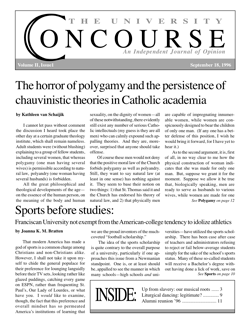Capitalism (2)
by Martha L. Blandford
Though Franciscan University is known for its theological emphasis, I was pleased to find alumni and affiliates of the University with various backgrounds contributing ideas to the Concourse. Of particular interest to me were Michael Welker’s article, “God and Caesar” and Julio Demasi’s follow up piece, “Keeping Caesar under God.”
I found Welker’s article most refreshing in a country where academia seems to be dominated by Keynesian economics. While I have not read David Schindler’s journal Communio, I have read Michael Novak’s book, The Catholic Ethic in the Spirit of Capitalism, which I admire greatly. As for Demasi’s ideas on economics, I must take issue with his apparent sense of a dichotomy between economic freedom and Christian morality.
An understanding of what works economically should start with the study of man. Pope John Paul II’s use of the personalist norm is the best framework for understanding how morality proceeds. In his book Love and Responsibility, he writes of the “incommunicability” and “unsubstitutability” of the person as the foundation for all human relations:
“No one can substitute his act of will for mine. It does sometimes happen that someone very much wants me to want what he wants. This is the moment when the impassable frontier between him and me, which is drawn by free will, becomes most obvious. I may not want that which he wants me to want—and in this precisely I am incommunicabilis. I am, and I must be, independent in my actions. All human relationships are posited on this fact. All true conceptions about education and culture begin from and return to this point.”
It seems to me that an environment that would most respect the nature of man, a person’s inner self, and the power of self-determination and free will is one that ensures his liberty. The only economic system offering such freedom to man is laissez-faire capitalism.
In his article, Demasi does not offer an alternative to capitalism; but he seems to hint that, whatever his ideal economic system might be, it would include certain controls, or “limits of social obligations.” My question is, who decides what my social obligations are? More importantly, who decides how my social obligations will be enforced? In practice, the answer is always: “the State.” And the consequence of governments setting the “limits of social obligations” is the unfortunate state of affairs in which we find ourselves today, where observance of and conformity to legal regulations forms a counterfeit to an authentic, internalized system of values.
Welker’s quote from Centesimus Annus, “It would appear that on the level of individual nations and of international relations, the free market is the most efficient instrument for utilizing resources and effectively responding to needs…But there are many human needs which find no place on the market,” indicates that capitalism is a means toward another and higher end, and is not the end in itself. In this sense, I agree with Demasi that meeting all human needs is not the role of the free market. The free market is simply the vehicle that ensures that our liberty will be protected. Given that liberty, the more fundamental questions of how to order our lives, what values to seek, and which virtues to practice take on greater significance. Indeed, liberty is the only context within which these questions of the higher order can be addressed.
Welker offered a definition of capitalism; I can understand his feeling a need to do so. I find that most people have a very confused, if not completely wrong, idea of what capitalism is. Perhaps this is because pure capitalism has not existed in this country, especially since the turn of the century, but continues to be blamed for the consequences of a mixed economy, i.e. welfare statism (both corporate and social welfare) that does not allow the “invisible hand,” as Adam Smith describes it, to operate the market justly. Despite good intentions, proponents of the welfare-state, managed-economy way of life have ended up bringing about results opposite to what they intended.
As a part of his definition, Welker states that capitalism is an economic system that protects the right of private ownership. It is also the one economic system that allows man to enter into trade by mutual consent only. The importance of such mutual consent cannot be overemphasized, since it protects the individual from harmful “use” by another. Again, the Pope states: “When two different people consciously choose a common aim this puts them on a footing of equality, and precludes the possibility that one of them might be subordinated to the other. Both…are as it were in the same measure and to the same extent subordinated to that good which constitutes their common end.”
Having said all this regarding capitalism, I understand that sin will still occur within individuals of the system; but that was the risk that God was willing to take in creating man with a free nature and equipping him with the faculty of reason. The impossibility of legislating morality and the higher virtues means that government regulations of social relations result in conformity at best, while morality and virtue call for something much deeper, and can only result from conversion, not coercion.
Because the role of government is to insure justice—not to instill virtue—in society, whether a person is reasonable, bigoted, saintly, or a sinner is not of prime importance in a political sense. These things are, of course, important to me as a believer, and indeed, in the light of faith they are eternally important. But salvation is precisely something which cannot be achieved by enforced conformity.
Martha L. Blandford, Class of ‘89
Martha (Cotton) and Scott Blandford live in Northern Kentucky.


